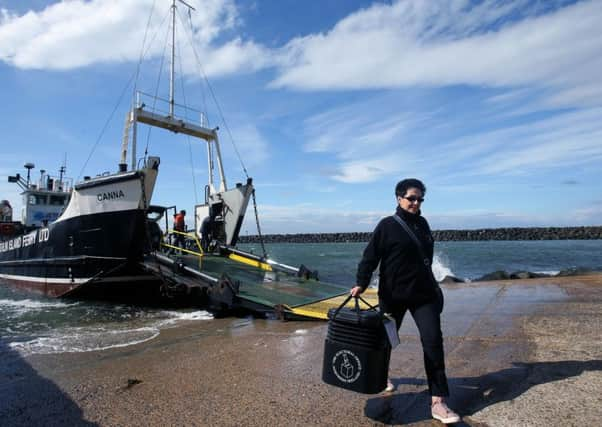Your chance to give your verdict on Stormont


The Province goes to the polls to elect 108 MLAs to the third Assembly since the restoration of power-sharing and the coming together of the DUP and Sinn Fein at the top of the Executive in 2007.
The last Assembly was only elected for a four-year term and voters were meant to have had their say a year ago. But the Government extended the Assembly term by a year to bring it into line with the Welsh and Scottish Assemblies.
Advertisement
Hide AdAdvertisement
Hide AdThe DUP and Sinn Fein are widely expected to return as the top two parties in that order – but both could lose seats, seeing their influence at Stormont eroded.
And, for the first time, the major parties will have the option of deciding against taking up their seats in the Executive and instead opting to be an official Opposition.
More than 1.2 million people are eligible to vote in today’s election, but there are expectations of another low turnout after a brief and largely uninspiring campaign.
Turnout in the 2011 Assembly election was 55.71 per cent – down significantly from the 62.8 per cent turnout in the 2007 Assembly election.
Advertisement
Hide AdAdvertisement
Hide AdDespite anecdotal evidence of widespread apathy about the election, one aspect of the contest likely to help turnout is the large number of independents and candidates from smaller parties.
That choice could encourage voters who otherwise would stay at home to come out.
Some constituencies have as many as 18 candidates contesting the six seats to be decided by today’s vote.
Overnight viewing figures for Tuesday night’s BBC leaders debate show that it was watched by an average audience of 98,000 people – an average of 18 per cent of the total TV audience at that point.
Advertisement
Hide AdAdvertisement
Hide AdThose figures had dropped to 87,000 and 16 per cent respectively for the post-debate analysis programme.
Those figures are almost identical to those for UTV’s debate – which was similarly dull – at the start of the campaign.
Unlike last year’s Westminster election, there will not be an overnight count.
Instead, the verification of ballots will begin at 8am on Friday and the count will begin after that process is complete.
Advertisement
Hide AdAdvertisement
Hide AdThe count is expected to stretch well into Saturday in at least several constituencies, with Monday set aside as a contingency day if recounts or other delays mean that the process is not complete by Saturday night.
The last Assembly election count was beset by serious delays, as was the 2014 European election.
However, the Electoral Office has said that it has reorganised the way in which the count is conducted in order to speed it up.
And, unlike the poll five years ago when there was a referendum on the AV voting system and a council election on the same day, this time there is just one election.
Advertisement
Hide AdAdvertisement
Hide AdThat means that the process of sorting ballots before counting begins should be faster.
Chief electoral officer Graham Shields urged voters to remember that this is a single transferable vote election, meaning that voters should list their preferred candidates by number, rather than putting an X beside a single candidate’s name.
He said: “At the last Northern Ireland Assembly election in 2011 over 12,000 ballot papers were rejected as spoilt. To ensure that your vote is counted remember to rank your candidates in order of preference by placing a ‘1’ next to your first choice candidate, a ‘2’ next to your second choice candidate and so on.
“You can vote for as few or as many candidates as you wish. If you place any other mark on the ballot paper it may not be counted.”
Advertisement
Hide AdAdvertisement
Hide AdAnn Watt, the Northern Ireland head of elections watchdog the Electoral Commission, said: “This year’s election is an opportunity for voters to have their say, and we don’t want anyone to miss out because they didn’t know what to expect on polling day.
“That’s why it’s important to remember to bring a correct form of photo ID with you to the polling station. Without it you won’t be given a ballot paper.”
What you need to know to cast your vote
• Polling stations are open from 7am until 10pm. Any voter who arrives at the polling station before 10pm and is still waiting at 10pm will be able to vote.
• Check your poll card to find the location of your polling station. Voters can only cast their vote at the polling station stated on the poll card. If you have lost your polling card you can find out where your polling station is by visiting www.eoni.org.uk or by calling 0800 4320 712.
Advertisement
Hide AdAdvertisement
Hide Ad• You don’t need your polling card to vote, but it can speed up the process.
• Don’t forget your photo ID – you can’t vote without it. You can still use it even if it is expired.
• Rank candidates in your order of preference. Place a ‘1’ beside your first preference, a ‘2’ beside your second preference and so on.
• You can vote for as few or as many candidates as you like.
Advertisement
Hide AdAdvertisement
Hide Ad• If you have a postal vote but have not had a chance to return it by polling day, you can hand it in at your local area electoral office before 10pm. You can’t hand it into a polling station.
• You can ask staff at the polling station if you need advice on the voting process and how to mark your ballot paper.
• You can take pictures outside the polling station and post them on social media to encourage your friends and family to vote – but don’t take any photos inside the polling station as you might find yourself in breach of strict laws to ensure that the ballot is entirely secret.